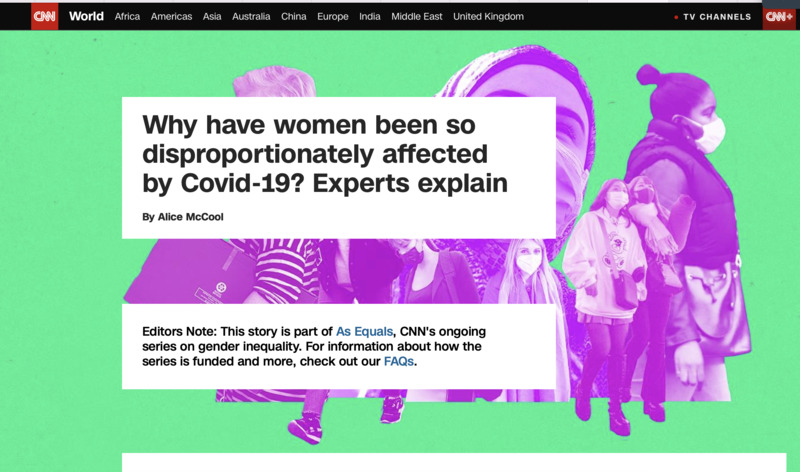Item
Why have women been so disproportionately affected by Covid-19? Experts explain
Title (Dublin Core)
Why have women been so disproportionately affected by Covid-19? Experts explain
Description (Dublin Core)
This is a news story from CNN by Alice McCool. This story talks about the inequalities women have faced during COVID-19. In a CNN poll, women in the G7 countries (US, UK, France, Germany, Canada, Japan, and Italy) felt less supported by their leaders than men did. Some of these inequalities include women being more likely to lose their jobs or take on more uncompensated care work. Other things, such as abortion services, were considered non-essential in some countries during COVID. Minority women and poor women were also more likely to work low-paying jobs and bear much of the economic strain. Additionally, trans healthcare was also viewed as non-essential in many places. In places like Uganda, many women lost their safety net provided from schools, resulting in rising teen pregnancies and early marriages. This article continues showing more examples of the hoops women had to jump through compared to men and demonstrates the social issues that got worse as a result from COVID lockdowns.
Date (Dublin Core)
Creator (Dublin Core)
Event Identifier (Dublin Core)
Partner (Dublin Core)
Type (Dublin Core)
Text story
Link (Bibliographic Ontology)
Publisher (Dublin Core)
CNN
Controlled Vocabulary (Dublin Core)
English
Economy
English
Healthcare
English
Home & Family Life
English
Public Health & Hospitals
English
Social Issues
Curator's Tags (Omeka Classic)
Contributor's Tags (a true folksonomy) (Friend of a Friend)
Collection (Dublin Core)
Linked Data (Dublin Core)
Date Submitted (Dublin Core)
04/03/2022
Date Modified (Dublin Core)
04/03/2022
04/05/2022
08/02/2022
Date Created (Dublin Core)
04/03/2022
Item sets
This item was submitted on April 3, 2022 by [anonymous user] using the form “Share Your Story” on the site “A Journal of the Plague Year”: https://covid-19archive.org/s/archive
Click here to view the collected data.

